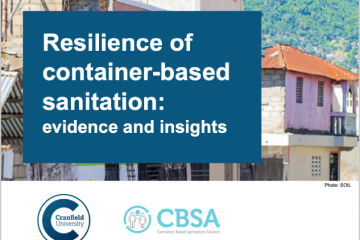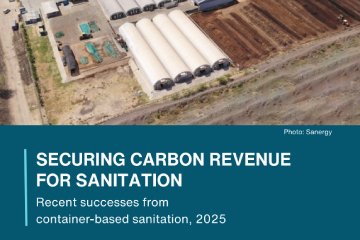More than a year into the global spread of Covid-19, the pandemic continues to have a devastating impact on health, economies and livelihoods around the world. Throughout this period, container-based sanitation (CBS) providers have been at the forefront of supporting some of the world’s most at-risk communities.
Peer support forums facilitated by the Alliance have highlighted the enormous challenges faced by these communities, while emphasising the resilience, business innovation and the critical role CBS providers are playing during these difficult times.
The global Covid-19 pandemic has made life incredibly difficult for the communities that CBS providers serve. In many places, inflation has sky rocketed while incomes plummeted. And the chronic under-investment in water, sanitation and hygiene (WASH) services makes it nearly impossible for people in these communities to protect themselves from Covid-19.
How can you take steps to reduce transmission where water and soap are scarce? How do you stay home when you don’t have a toilet? How can people possibly socially distance in dense urban areas?
During this challenging time, the Alliance has provided forums for peer support, sharing information and developing shared messaging and outreach. These discussions have highlighted the following insights from the frontlines of CBS provision:
CBS providers played a key role in the Covid-19 response, thanks to high levels of community trust
Many CBS providers supported the Covid-19 response by using their networks and close relationships with hard-to-reach communities to disseminate public health messaging and to counter misinformation. They also distributed masks and soap, supported behaviour change through training, installed additional water points and brought partners together for sharing best practice. This was enabled by the trust providers have built up in the communities they service, where there can be high levels of scepticism as a result of historical marginalisation. Thanks to this engagement, many members have significantly strengthened their relationship with local authorities.
The pandemic has underlined the importance of water, sanitation and hygiene
The danger of disease is nothing new to those working in water, sanitation and hygiene provision, who are only too aware of the constant threat of water-borne diseases such as cholera and diarrhoea to communities without access to adequate WASH services. With WASH playing such a critical role in preventing the spread of Covid-19, the pandemic has put renewed focus on its importance.
CBS was swiftly and widely recognised as critical infrastructure
An early concern for CBS providers was whether services would be able to continue operating as countries started locking down and restricting movement. However, all CBSA members quickly gained recognition as essential services and were able to continue their operations.
Despite the challenges, in 2020-21, CBSA members serviced more toilets than ever
With so many people confined to their homes, demand for CBS services increased in some areas. As a result, and despite the devastating impact the pandemic has had on the communities they serve, in 2020-21, CBSA members collectively served more people than ever before, at 169,963. While this figure is lower than pre-pandemic forecasts for the period, achieving an increase in the face of unprecedented global upheaval demonstrates the value of CBS to communities, and signals the essential role it plays in protecting people from disease.
High-quality CBS safety standards facilitated Covid-19 transmission reduction strategies
Thanks their work ensuring that staff work under the safest conditions possible, CBS providers were already implementing strict hygiene measures and using a lot of high-quality personal protective equipment (PPE) before the pandemic, so complying with additional Covid-19 requirements was an easy lift. Members were also quick to implement further strategies to minimise the risk of Covid-19 transmission for their staff and customers, including, for example, through supporting staff who could to work from home, reducing collection frequency by giving clients more containers/sawdust/bags/refills, changing collection routes and restricting the numbers of staff undertaking collections, and halting door-to-door payment collections.
Recognising their vulnerable circumstances, CBS providers put the customers first
As a service particularly suited to low-income communities, many of those who subscribe to CBS services work in the informal sector, negatively affecting their ability to pay for CBS services. In some places, inflation has sky rocketed while incomes have plummeted. Remaining sensitive to the needs of their customers, providers have made a number of provisions around payments, including extending grace periods, implementing temporary fee reductions and fundraising to address delays and shortfalls.
Funders have supported organisations through bold and helpful initiatives
The funding community took supportive action to ensure essential services such as CBS could continue to be provided to low-income communities throughout the crisis. This included opening new grants, increasing flexibility in existing grants and pledging long-term support as partners throughout and beyond the crisis.
The pandemic catalysed the application of digital working
The reduced opportunity for face-to-face contact has compelled providers and customers to rely on digital tools, speeding up their adoption across many areas, including customer liaison, marketing and sales. In Haiti, SOIL rolled out route optimisation software and improved efficiency of collection routes even with the social distancing provisions made for the pandemic response. Moreover, huge increases in the number of people working from home changed mindsets around what this means for productivity while more robust human resources were implemented to manage a remote workforce, some of who have never met their colleagues in person.
Investing in the human rights to water and sanitation is central to building resilience for future global health shocks. Increased pressure on limited resources threatens to slow progress in global efforts to reach everyone by 2030 – but the pandemic’s disruption to economies highlights the monetary value of investing in sanitation to protect people from disease. This should be a turning point for WASH investment and reaching everyone, everywhere with clean water and safe sanitation.
Read more
Toilet Board Coalition’s Cheryl Hicks interviews CBSA (impact of the pandemic at 14min24sec)
Global collaboration amidst a pandemic
The SDG Impact of COVID-19: The view of Virginia Gardiner, Founder and CEO of Loowatt
Sanivation COVID-19 Response
COVID-19 is Impacting the world’s most vulnerable in significant ways
LESSONS FROM COVID-19 – The Resilience of Innovative Sanitation and Hygiene Ventures (PDF 1Mb)
How can the global WASH sector respond better in future crises?


